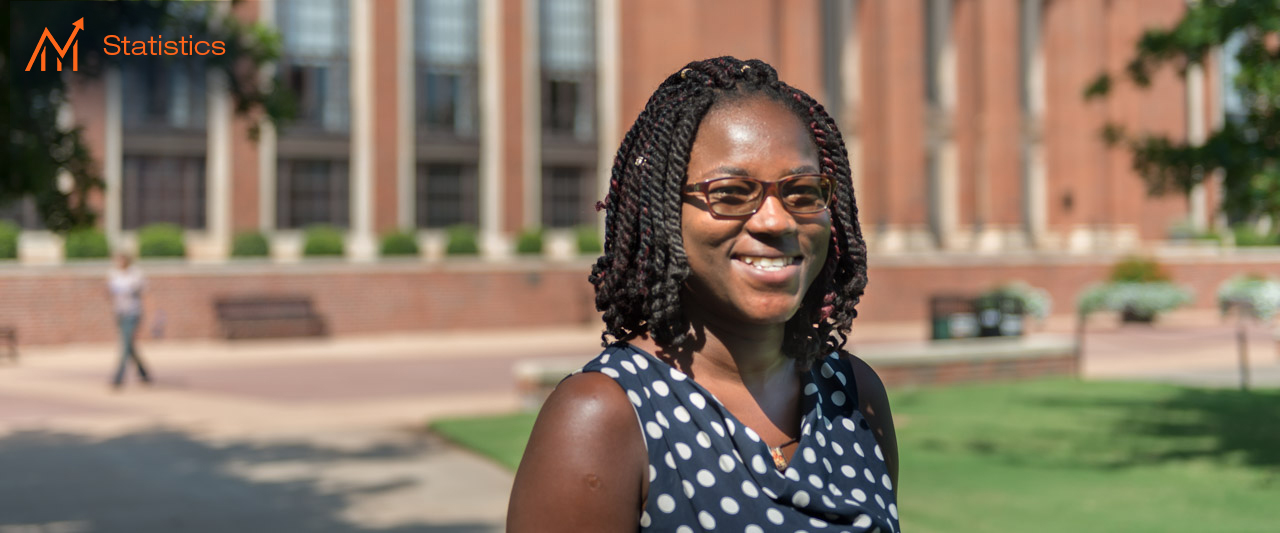Josie Akosa grew up more than 6,000 miles from Oklahoma State University in the West African nation of Ghana. Her father—a civil engineer—and her mother—the head of the equivalent of a community college—pushed their five children to aim high, which is how Akosa wound up in OSU’s Department of Statistics as a Ph.D. candidate.
“My dad always said, ‘I know I can give you money to do whatever you want, but I would rather invest in your education,’” said Akosa, who graduated Dec. 14. “I think he has done that pretty well.”
She earned a 2011 bachelor’s degree in mathematics at Ghana’s Kwame Nkrumah University of Science and Technology. She then fulfilled the obligation of serving her nation for a year as a teaching assistant, and asked her professor for advice about pursuing a career in academia.
“He recommended the University of Texas at El Paso,” Akosa said. “He had met their professor in charge of graduate admissions at a conference, and she told him about the program. He said it would be a good fit for me.”
So Akosa became the first member of her family to move to America, completing a 2014 master’s degree in statistics at UTEP. Her adviser there was an OSU alumna who said Stillwater would be a good place for Akosa to pursue a doctorate. She was correct, and Akosa’s continued academic success has earned her a position starting in January as a visiting assistant professor at the University of Notre Dame’s Mendoza College of Business.
It continues the ongoing success story of the Akosa family. Her four siblings, who all live in Ghana, are a teacher, a civil engineer, a college graduate with a quantity surveying degree, and a medical school student.
Coming from a household with high expectations was key to Akosa’s success. Another key was her determination to follow her dreams, even when it wasn’t easy. She could have begun a career in 2012 as a mathematician or math teacher in Ghana. But she wanted to focus on an academic discipline that was more application and less theory than math. She decided to study statistics, and she moved halfway across the planet to get the education she needed.
“My mom initially wasn’t comfortable with me coming to America,” Akosa said. “She felt like she was leaving me to survive on my own. But she said, ‘I know you are strong and you will survive.’”
She did have the advantage of speaking English—which is the primary language used in Ghanaian schools—in addition to the tribal language of Twi. But she still experienced culture shock in both El Paso and Stillwater.
“When I first moved to America, I realized I was in a place where you are at liberty to do anything you want,” Akosa said. “In Ghana, it’s all about virtue. You can’t just talk to a person older than you in any way you want. I had to adapt.”
She also had to adapt to the American educational system and teaching style. The first year was “really hard, but other than that, everything was OK.”
There were some smaller differences as well. She doesn’t understand why Americans say “soccer” for the sport the rest of the world calls “football,” and why we use “football” for a game that involves very little kicking. She was also disappointed that the food in Ghana is much spicier than in America, even in El Paso, which is known for its Tex-Mex cuisine.
“I noticed that almost everything in America has sugar or cheese,” Akosa said.
Her hometown of Kumasi has more than two million residents, making it significantly bigger than both of her American college towns. That was also an adjustment, though she appreciates the differences.
“Stillwater is quiet,” Akosa said. “It’s not too busy. No traffic. It’s a family. Everybody says ‘hi.’ It’s not like the big cities where nobody cares about you. It’s like people here really care about you.”
She has become a big advocate for studying abroad, which she sees as beneficial for anyone.
“Just the diversity aspect would be enough to make the experience valuable,” Akosa said. “It builds you as an individual. You get to know how to interact with different types of people. I have learned about a lot of cultural backgrounds. I have made friends from all over the world.”

